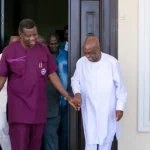Judiciary Should Not Be Blamed For Failure Of Political Class -Tinubu

Nigerian President Bola Tinubu on Monday, urged political actors to stop attacking the judiciary especially after the determination of political and electoral cases.
Tinubu, who decried attacks on the judiciary by the politician said “the judiciary should not be blamed for the failure of the political class.”
He further urged political actors to stop giving biased analyses of the judiciary.
The president who said he was proud of the achievements of the judiciary noted he could not imagine what the country would have been subjected to without the judiciary.
Tinubu who was represented by the Attorney-General of the Federation and Minister of Justice, Mr. Lateef Fagbemi, SAN, spoke at the Judges Conference held in Abuja.
He said, “While there may be misgivings here and there, we cannot begin to imagine what our country would have been subjected to if there was no judiciary. I am proud of the accomplishment of our judiciary in the cause of nation-building, both locally and on the global scene.
“I wish to observe that in the cause of demonstrating this commitment to the advancement of the rule of law and democracy, especially in political and electoral cases, the judiciary has come under myopic criticism and attacks.
“On many occasions, the judiciary has come to the rescue by intervening to safeguard democratic processes and preserve or restore the wishes of the electorates.
“The judiciary should not be blamed for the failing of the political class. We, as actors, must learn not to portray or analyse the judiciary from the narrow prism that is solely based on our political interests.”
The president said he was aware of the challenges facing the arm of government, promising to address them.
“As a patriotic citizen and President, I am not oblivious to the challenges hampering the commitment of the judiciary to deepening the rule of law and democracy
“Some of the challenges as identified by the National Judicial Council, include; inefficiency and gaps within the process of appointment of judicial officers; lack of transparency and accountability in judicial process and administration of justice.
“The need to improve and sustain the capacity of Superior Courts to promote and protect the rule of law; delay in justice delivery; the perception that the judiciary may not be able to sustain its independence and concerns about the quality of judgments and inadequacy of resources needed for the judiciary to provide efficient administration of justice in the 21st century.
One of the cardinal items on our renewed hope agenda under my leadership is our commitment to drive the judiciary to achieve sustainable socio-economic growth.”
The president also urged the judiciary to consider the appointment of those in private practice to the court of appeal and the apex court of the land.
“He said, “I am of the strong view that to further strengthen our appellate court, qualified, experienced, and diligent private legal practitioners should be considered for appointment to both the Appeal and Supreme Court, as the nation will benefit from this.”
Tinubu added he had directed the Revenue Mobilisation Allocation and Fiscal Commission to review the 114 per cent increase in the remuneration of judicial officers, which according to him was unacceptable.
He said, “I have directed the RMAFC to review its previous unacceptable recommendation of a 114 per cent increase in the remuneration of judicial officers and come up with a more realistic rate that will reflect the present economic reality.
“I am optimistic that the process will be concluded as soon as possible, making the judiciary independent as I have done elsewhere.”
Speaking, the Chief Justice of Nigeria, Justice Olukayode Ariwoola, said the conference allows the judiciary to assess the progress it made throughout the year and to evaluate how well it was able to discharge the onerous task placed on it as the arbiter of justice and custodian of the rule of law.
He said, “Although as judicial officers, we must constantly strive to attain a high standard of excellence and ensure that the strength of our character is at best, unimpeachable, one fact which is glaring but ironically overlooked is the fact that Judges are humans too!
“What this implies is that we are neither flawless nor precluded from making occasional errors.
“Consequently, as we take stock, it is of utmost importance that we do so dispassionately and objectively to enable us to effectively achieve the second purpose of the Conference which entails mapping out strategies, cross-fertilizing ideas and eliciting definitive decisions, necessary for steering the Judiciary forward in the coming year.”

Hafsoh Isiaq is a graduate of Linguistics. An avid writer committed to creative, high-quality research and news reportage. She has considerable experience in writing and reporting across a variety of platforms including print and online.









